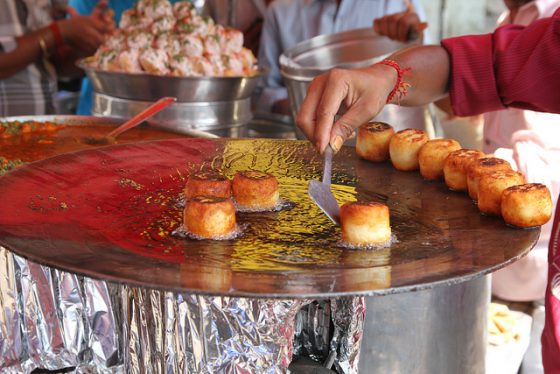Yes – Street food should be banned:
- In most cases, street food is prepared in an unhygienic way.
- It is very difficult to conduct checks on hygiene at all the street food making places.
- Street food carts encroach footpaths, parking places and roads and worsen the traffic issues.
- The quality of oil and the raw food items that are used in cooking may not be suitable to maintain good health.
- A lot of these street foods are junk foods that are unhealthy and addictive.
- Street food carts are often exposed to dust and vehicular pollution.
- Street food vendors add substances like ‘Monosodium glutamate’ (MSG) to make the dish tasty and addictive. These type of food additives are very harmful and causes health problems.
- In India, many people are slipping into poverty due to huge medical expenses. One of the main reasons for many health problems in India is taking unhealthy food. Hence banning street food and encouraging healthy and nutritional food will make India a healthy nation.
- It is difficult to hold them accountable in cases of food poisoning, adding addictive drugs etc.
No – Street food should not be banned:
- Street food is satisfying the hunger of many common people. Food in most restaurants is not affordable to many. For many middle-class people, eating at street food carts is very cheap and convenient.
- Lakhs of street vendors are making a living by preparing and selling street food.
- There is no long process to start a street food cart and earn for living. It’s very easy for anyone to start selling street food. Many street vendors cannot afford a shop to start their business. If street food is banned, the unemployment problem will be even worse. And the Indian government is not in a position to give alternate employment opportunities to all the street food vendors. Street food business is the easiest business to start with low investment. Small scale businesses are very helpful for the economy too.
- Banning street food may eliminate some distinct cultural foods, that are now available only as street food.
- If there is no street food, restaurants in some localities may tie up to charge more for the dishes because people will have no other option.
- These days people are more cautious about health and hygiene, so people will choose to eat at carts where food is prepared in a hygiene way. Hence there is no need to worry because unhygienic street food carts will automatically be eliminated due to no demand.
- If street food is banned, local talents will be neglected. Innovation and creativity will only be in the hands of big restaurants.
- Not all street foods are junk foods. Some street food carts sell healthy food like sprouts, carrot juices etc.
- There is no guarantee of hygiene at restaurants’ kitchens. Food checks are not conducted regularly in general.
Facts:
- Street Vendors (Protection of Livelihood and Regulation of Street Vending) Act, 2014 is brought to regulate street vendors and to protect their rights. But this bill has several legal ambiguities.
- ‘National Association of Street Vendors of India (NASVI)‘ was formed in 1998 to protect the rights of street vendors.
Conclusion:
Banning street food entirely is not at all possible and not needed, especially in India where lakhs of people are eating street food daily. But there is a need to regulate the street food industry. A few things like gloves and hair caps should be made compulsory. Sudden hygienic checks must be conducted. Strict rules must be implemented to avoid the congestion of roads.
Your Turn…
What is your opinion on street food? Express your thoughts in the comment section below. And subscribe to our blog to read answers to trending GD topics.
Pic credits : Marco Zanferrari via Flickr under CC 2.0
Copyright @ Group Discussion Ideas.

